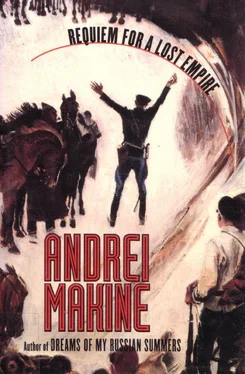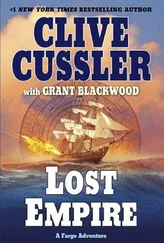In the morning the city was in flames and as the fire advanced it seemed to be driving the last of the foreigners back toward the sea. I found myself on a beach among a crowd of my compatriots who were waving their arms in the direction of several small boats as they came toward us. Out at sea a massive white liner could be seen, a red flag stirring slightly in the wind. The little boats appeared motionless, stuck fast in the oily blue of the sea. A few hundred yards away from us, in the streets that led to the coast, soldiers were running, shooting, falling. Their deadly game was advancing toward us and at any minute now would compel us to join in. Hands reached out toward the to-and-fro of the oars, anguished and exasperated shouts stuck in people's throats. This desire not to be killed, idiotically, on the sundrenched beach took hold of me, contagious like all mass hysteria. I was on the brink of following the men heaving enormous suitcases onto their shoulders and walking into the water so as to increase the distance between lives that were suddenly feverishly precious to them and death. It was my lack of any luggage that brought me to my senses. What little I possessed had burned in the hospital destroyed by shells during the night. That morning a member of the embassy staff had lent me his razor.
I sat down on the sand, observing the scene with an almost absentminded gaze. The number of suitcases the men were loading onto the boats astounded me. So somewhere there must exist a life, I said to myself, where all these things it was so difficult to transport were irreplaceable. I pictured this life, for which my own past had left me ill suited. I guessed at its delights: when augmented by the contents of the suitcases, it seemed to me quite legitimate and touching. As I stood up to assist in the loading process, I ran into a man, trying to climb on board alongside his luggage, who took me for a competitor. I drew back, he clambered up, avoiding my eye. Beyond a jetty a shell hurled up a thick geyser of sand. The man, already on board, quickly ducked, pressing his forehead against the leather of the suitcases. Someone yelled, "Quick, quick, we're leaving!" Another, who was still staggering about in the water, swore at him. People were jostling one another now, not hiding their fear.
Just after that explosion I saw a man who had no luggage either, standing slightly behind me, apparently watching a quarrel between two candidates for departure. His first remark was not addressed to anyone in particular, "At moments like this one becomes quite naked." Then, turning to me, he added, "Since you have nothing to load on board, I should like to ask a service of you. On the express instruction of the ambassador…" He uttered these words in a tone that was at once respectful and jocular, thus conveying to me that his own authority needed no support from that of the ambassador, who had already left for home. I stared at his face, with a memory of having glimpsed it at an embassy reception. His features had stuck in my mind because he looked like the French actor Lino Ventura. I had forgotten him for the same reason, mislaying his face among images from films. Anticipating my question, he explained, "We shall leave together a little later…" He then threw a final glance at the boats overloaded with suitcases and I thought I saw in his eyes a brief flash of irony, which faded at once into a neutral expression.
The jostling on the beach made us invisible. He led me toward a structure made of cement blocks, beyond which a four-wheel-drive vehicle was parked. We headed toward the city, which looked as if it were being drawn up into the sky by the smoke from the fires. As he drove along he told me his name (one of the names that I would come to know him by) and asked me to call him "counsellor" in the presence of the people we were about to meet. For a good few moments now I had been living as if at one remove from reality. The simplicity, almost indifference, with which the counsellor explained to me the task that awaited me only served to accentuate the strangeness of the situation. "Your presence at these negotiations, or rather at this bout of haggling, will be doubly useful. One of the parties has been wounded and, well, in view of his age, the heat, the emotion… You See, we need to keep his old heart beating until the final agreement. Furthermore, if I'm not mistaken, you speak his language."
At first I thought his detached tone was a pose, a bravado he was assuming for my benefit (his resemblance to the film actor was partly responsible for my misreading of this). But when we encountered crossfire in one street and he managed to avoid the bursts of gunfire by squeezing the vehicle close to a wall without abandoning his air of indifference, I grasped the simple fact that he was long accustomed to danger.
We arrived in a district I did not know, and which, though only a few streets away from the fighting, seemed asleep. Only the traces of smoke on the ocherous surface of the houses and the cartridge cases we slipped on as we walked betrayed the presence of war. We crossed a courtyard and another linked to it, stopping before a narrow passageway that made one think of the entrance to a maze. Half a dozen soldiers who were sheltering there from the sun emerged, searched us, then allowed us to pass inside.
The windows, protected by metal screens, sliced through the darkness with long rays of sunlight. These blinding blades cut into our eyes. After several seconds of sightlessness I made out two guards, one squatting beside the door, his submachine gun laid across his knees, the other watching the street through the slit between two sheets of steel. Two other men faced one another: seated with his back to the wall, a Yemeni with a glistening brown face and a multicolored turban that hung down onto one shoulder like a ponytail and, at the other end of the room, half reclining in an armchair, a very pale man, with a swathe of bandages across his brow-like a strange replica of the turban. His angular features, sharpened by weariness, seemed almost transparent beneath glistening sweat. Despite his white hair there was in his face the kind of youthfulness that surges up in elderly men at the moment of a mortal challenge. Our arrival interrupted their discussion. All one could hear now was the furious drumming of flies caught between the glass and the steel, the distant sounds of shooting, and the breathing of the wounded man, short gasps, as if he were about to burst into song but could not bring himself to do so.
It was he who greeted us and began speaking, forcing his breathing to adopt a regular rhythm. The counsellor asked me to translate. The man stopped, to give me time to do this. But I remained silent, feeling myself to be at a vertiginous distance from this stifling room.
The wounded man was speaking the same language that the sleeping infant had heard amid the mountains of the Caucasus, on the darkest night of my life.
The man I had to keep alive and whose remarks I had to translate knew that his death would have simplified the bargaining. He told me this with an imperceptible smile, as I was giving him a further injection. "I feel like a fabulously rich old man, whose stamina is the despair of his heirs…" This was one of the sentences I chose not to translate. And indeed, from his very first words, a kind of double translation had become established between us: I did my best to interpret the arguments he put and those of his adversaries, but parallel to this, I was noting the revival within myself of this language that had remained mute for so many years.
The object of their laborious verbal struggle quite soon became apparent to me in the form of a conundrum. The man in the turban, one of the military leaders of the rebellion, had captured three westerners. The wounded diplomat was trying to obtain their release. The counsellor was able to put pressure on the Yemeni because his troops were being armed and supported by us. In return for this service the diplomat was to guarantee the neutrality of France, which would turn a blind eye to our military involvement in the conflict. The deal was on the point of being concluded ten times but suddenly the Yemeni would lose his temper and begin to denounce the perfidy of the West and the great Satan of America. Each time his rage- sometimes expressed in blunt and rudimentary English, sometimes in a propagandist Russian that was no doubt learned in Moscow – seemed to sound the death knell for the negotiations, I was ready to get up. But neither the Frenchman reclining in his armchair, nor the counsellor, listening with his head tilted slightly toward me, seemed impressed by these crises; they waited in silence for them to come to an end, each one with his own manner of being politely indifferent. An aide de camp would come in and spend a long time whispering into the ear of the chief, who kept nodding as he gradually abandoned his air of fury. The discussion resumed and followed its already familiar circular course: the Yemeni liberates the hostages, the counsellor arranges the delivery of arms, the diplomat gives his word that his government will be discreet. I now understood that success depended not on the logic of the arguments but on some ritual of which only the Yemeni knew the secret and that the Frenchman and the Russian were trying to grasp. An "open sesame."
Читать дальше










